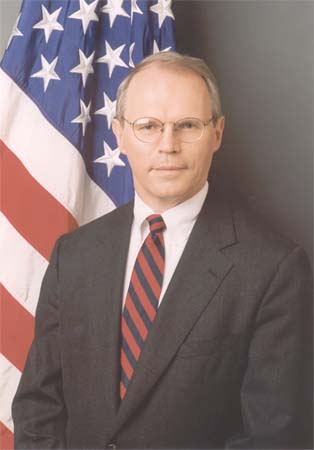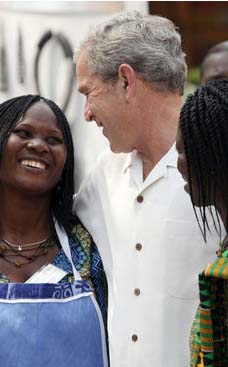
Assistant Secretary of State Christopher R. Hill says that the United States could establish diplomatic relations before the end of Bush's term if North Korea completely dismantled its nuclear program. "They would like the establishment of diplomatic relations," Hill said in an interview Saturday in Beijing. "We've told them we are not prepared to do that until they give up their nuclear materials. . . . We can begin the process of discussing what we are going to do, whether we are going to open embassies, that sort of thing. . . . But we will not have diplomatic relations with a nuclear North Korea". Christopher R. Hill, assistant secretary of state for East Asian and Pacific Affairs and former U.S. ambassador to South Korea, served as a Peace Corps Volunteer in Cameroon.
Hill says relations with North Korea possible
U.S. relations with North Korea possible, diplomat says
The thaw could begin during Bush's term if Pyongyang dismantled its nuclear program, the American says.
By Barbara Demick, Los Angeles Times Staff Writer
March 4, 2008
BEIJING -- The success of last week's concert in Pyongyang by the New York Philharmonic raises the prospect that the United States might start normalizing relations with North Korea, possibly taking the first formal steps before the end of the Bush presidency.
Although the musicians and their entourage flew out on Wednesday, more Americans than at any time in the recent past have been visiting a country that President Bush dubbed part of an "axis of evil."
Five U.S. government employees are stationed semi-permanently in North Korea, including a former Foreign Service officer who was brought out of retirement to coordinate logistics for disarmament teams from a Pyongyang hotel room.
Assistant Secretary of State Christopher R. Hill says that the United States could establish diplomatic relations before the end of Bush's term if North Korea completely dismantled its nuclear program.
"They would like the establishment of diplomatic relations," Hill said in an interview Saturday in Beijing. "We've told them we are not prepared to do that until they give up their nuclear materials. . . . We can begin the process of discussing what we are going to do, whether we are going to open embassies, that sort of thing. . . . But we will not have diplomatic relations with a nuclear North Korea.
"There are people who won't want to recognize North Korea . . . there are people who don't want to recognize any number of countries," he said. "But in the context of denuclearization, I think there would be strong support."
President Bush has called North Korea a "prison for its own people" and said at a news conference last week that he never hoped to have a personal relationship with leader Kim Jong Il.
Hill said that diplomatic recognition would not imply acquiescence to North Korea's human rights record.
"Obviously we have continued differences with them, but we can do that in the context of two states that have diplomatic relations," he said.
North Korea is one of the few countries with which the United States has no diplomatic ties -- Cuba, Iran, Somalia and Bhutan are among the others. There is probably no other nation that has admitted so few U.S. citizens. The entourage of nearly 300 people with the New York Philharmonic was by far the largest number of American visitors in more than half a century.
For the concert Tuesday night, the orchestra was permitted to play "The Star-Spangled Banner" along with the North Korean national anthem and to display an American flag, albeit slightly smaller than a North Korean flag on the other side of the stage. The North Koreans also appear to have removed some of the more graphic anti-American billboards from the streets of Pyongyang.
"The concert opened a window into a set of possibilities that didn't seem to exist before," said Evans Revere, a former diplomat and head of the New York-based Korea Society, who attended the concert. "The North Koreans we met were as welcoming as possible. The message was that we are trying to have a more normal relationship with the United States."
Other American visitors to North Korea have come away with the same message.
"They were extremely friendly, ready to suck up knowledge," said Siegfried Hecker, the former director of the Los Alamos National Laboratory who visited North Korea last month.
Hecker is one of a number of Americans who have been permitted into North Korea's main nuclear facility at Yongbyon, 60 miles north of Pyongyang.
A nuclear reactor, a fuel-rod factory and a reprocessing plant, where weapons-grade plutonium is extracted from fuel rods, are in the process of being dismantled there under U.S. supervision. Four American nuclear experts are living in a guesthouse at Yongbyon to oversee the process.
An American Foreign Service officer working under the auspices of the State Department's Nonproliferation and Disarmament Fund moved to Pyongyang in November to help bring equipment into North Korea. (The State Department requested his name not be published for security reasons.)
It is only the second time that a State Department employee has been based in Pyongyang.
In the mid-1990s, U.S. disarmament experts were admitted to oversee a Clinton administration deal under which North Korea was to receive energy assistance in return for denuclearization. The Bush administration scuttled the deal after accusing North Korea of cheating.
Many experts believe North Korea has no intention of giving up its nuclear weapons or its anti-American ideology.
"Using America as a scapegoat for the country's economic ills got Kim Jong Il through the famine and sanctions and has continued to prop him up," said Brian Myers, an expert in North Korean propaganda.
He says Kim has no other way to explain why his people are hungry while capitalist South Korea is thriving. "By negotiating normalization, you're effectively asking Kim Jong Il to commit political suicide."
North Korea badly needs to be removed from a U.S. blacklist to win international aid. Financial institutions are barred from dealing with North Korea under the Trading With the Enemy Act and the country's designation as a state that sponsors terrorism.
The Bush administration has promised to remove these designations after North Korea releases a declaration detailing all aspects of its nuclear program, including possible cooperation with Syria. Most important, it has to account for weapons-grade plutonium that is believed to be hidden somewhere other than Yongbyon.
According to Hill, China has suggested the opening of a U.S. liaison office in Pyongyang as a way to gradually improve relations, but the North Koreans rejected the idea.
Experts say normalization could begin with removing sanctions and proceed slowly.
The United States did not normalize relations with Libya until 2006, three years after it scrapped its nuclear weapons program. Congress has yet to approve funding for a U.S. Embassy in Tripoli.
barbara.demick@latimes.com








